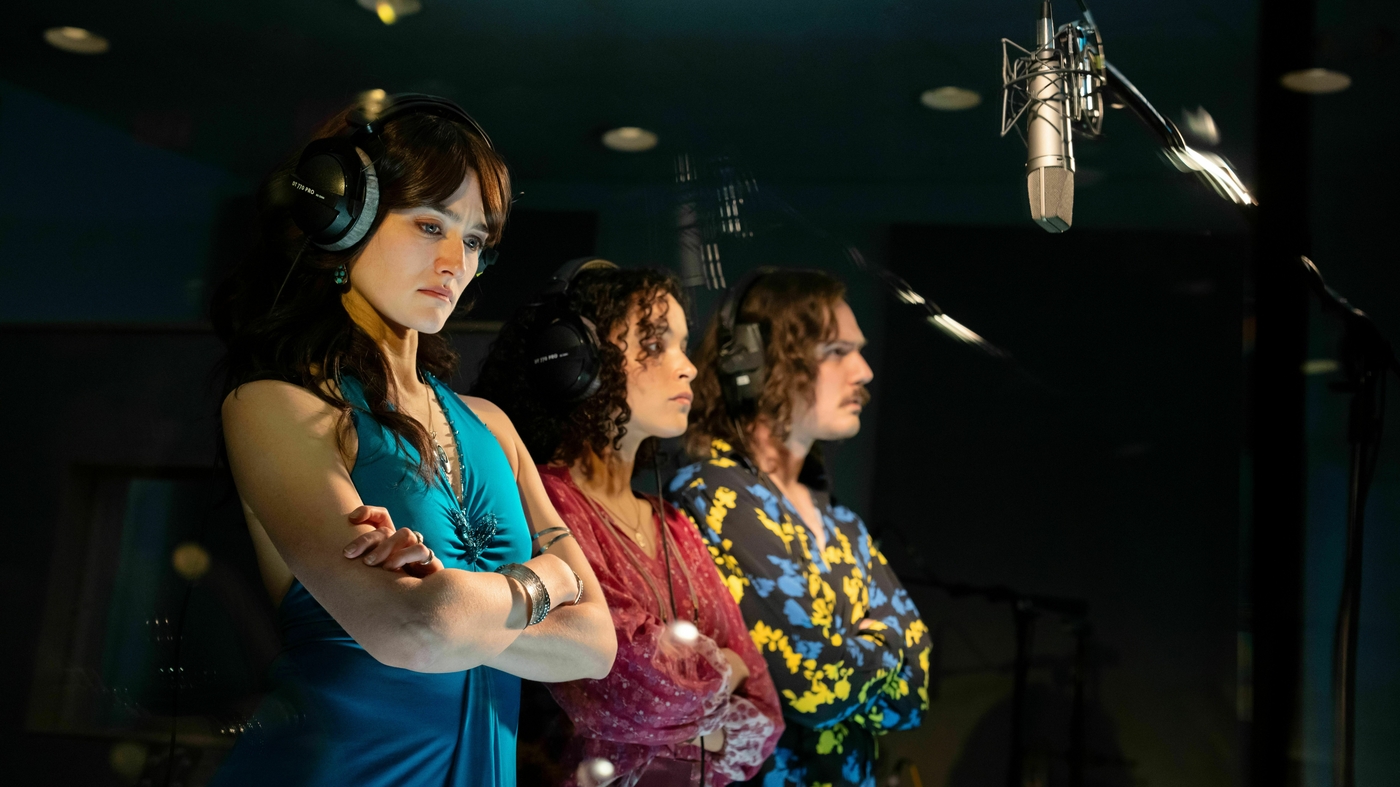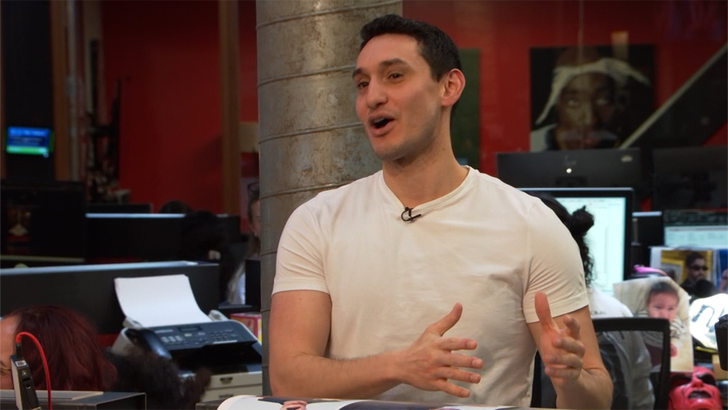Lifestyle
A new play peers into a band's life, from the inside

Stereophonic, a new play on Broadway with music by Arcade Fire’s Will Butler, tracks the volatile creation of a rock and roll album over the course of a year in the 1970s.
Julieta Cervantes/Stereophonic
hide caption
toggle caption
Julieta Cervantes/Stereophonic

Stereophonic, a new play on Broadway with music by Arcade Fire’s Will Butler, tracks the volatile creation of a rock and roll album over the course of a year in the 1970s.
Julieta Cervantes/Stereophonic
Stereophonic, a new play on Broadway with music by Arcade Fire’s Will Butler, tracks the volatile creation of a rock and roll album over the course of a year in the 1970s.
The fictional five-member band, on the surface, looks a lot like Fleetwood Mac – it has two couples, one American, one British, and they squabble and break up as they make the record.
But, for the show’s creative team, it is a hyper realistic look at the costs and glories of making art.
“There are iconographic elements that I stole from Fleetwood Mac,” said playwright David Adjmi, “but I also stole from other things.”
He did a lot of research on bands of the 1970s and recording studios of the time and has written the play in a documentary style.
“We’re going to ask you to peek in,” Adjmi said. “And that’s what creates this kind of weird, titillating feeling for the audience and the feeling that you’re getting something really, really intimate.”

The set for Stereophonic is a working recording studio – from the banged-up mixing console to the 24-track tape machine to the big glass windows looking into a soundproof room where the musicians play and listen on their headphones. The vintage equipment is so real that director Daniel Aukin said, “I’ve learned recently that the song ‘Midnight Train to Georgia’ was recorded on it.”
Over the course of three hours, the audience really gets to know the band and the engineers. They see the musicians hanging out, eating junk food, rolling joints, talking about movies, and squabbling.
Adjmi said he began writing Stereophonic at a point when he was feeling discouraged with theater and thought about quitting. The fights the characters are having with each other are the internal fights he was having with himself.
“Why am I doing this?” he said he asked himself. “I shouldn’t be doing this. This is terrible. It’s not worth it. No, it is worth it. It’s beautiful. I wouldn’t trade this for anything.”

To help the group feel like a band, Will Butler had them open for him in Brooklyn.
Julieta Cervantes/Stereophonic
hide caption
toggle caption
Julieta Cervantes/Stereophonic

To help the group feel like a band, Will Butler had them open for him in Brooklyn.
Julieta Cervantes/Stereophonic
Turning actors into musicians
Before he had written a word, Adjmi got together in a diner with Will Butler, of the band Arcade Fire, to see if he’d write music for the play. Butler said he got excited as he learned that in the show, the music would be in the process of being created.
“And you’d hear a demo and then you’d hear them mixing in the vocals and you’d hear fragments of it. And the fragments are so compelling, and you want more, but you can’t have more,” he said. “And then, just that initial idea was so rich, I was like, ‘I would love to do this!’”

But in order to pull off Adjmi’s idea, they had to turn actors with some musical ability who could pull off nuanced characters into a believable group of musicians. And that proved complicated.
“It was a long process to find the right balance of people,” said director Daniel Aukin.
“We had to have actors who you would want to cast in a Chekhov play, and we had to have actors who had enough musicality that we could project forward, given support, that they could get to where we needed them to be to pull it off.”
While Chris Stack, cast as the drummer, was already a solid player, the rest of the cast took music lessons before rehearsal, said Will Brill, who plays the band’s bass player.
“I learned to play really badly right before we started rehearsals,” he said. “And, really, I mean, did a lot of catching up during rehearsals. Like, I didn’t play a note before this thing!”
YouTube
Butler said it was a leap of faith, hoping these five actors could become a band. For the first few weeks, much of the rehearsal process was spent in band rehearsals, rather than acting rehearsals. Then, Butler asked the quintet to open for him at a club in Brooklyn.
“And they were great and they learned so much,” he said, “and even just getting to the point where they had to stand on a stage in front of people, before they played a note. Like, that taught them so much of what a being a band is like, that taught them the energy that they’re bringing to the studio.”

Andrew R. Butler and Eli Gelb as sound engineers use realistic-seeming equipment.
Julieta Cervantes/Stereophonic
hide caption
toggle caption
Julieta Cervantes/Stereophonic
The play tracks the band’s process of creating an album for over a year.
Brill said he’s moved by the final scene of the play, which is just the engineer onstage alone, playing with the faders of that vintage recording console.
“There is this glass box above his head that sort of looks like a thought bubble in some way,” said the actor, “and it’s as though the artist is sitting alone at his table and you wonder, like, ‘Did he dream all this? Did it ever exist? Was this David [Adjmi] sitting alone at his table with all of his demons and gods?’ It’s very, very moving to me.”
Jennifer Vanasco edited the audio and digital versions of this story.

Lifestyle
Anne Hathaway finds love with a pop star in 'The Idea of You' : Pop Culture Happy Hour

Lifestyle
TMZ TV Hot Takes: Britney & Jamie Lynn Spears, George Santos, Travis Kelce

It’s the middle of the week, and TMZ’s got a whole bunch of clips to get you over the hump (day).
TMZ Live
TMZ Live
TMZ.com

On “TMZ Live” … Harvey and Charles analyze Britney Spears calling her sister Jamie Lynn a “bitch” in a rambling, somewhat incoherent video.
TMZ on TV
TMZ on TV
TMZ.com

Our “TMZ on TV” crew talks George Santos jumping back to his drag queen persona for a Cameo.
TMZ Sports
TMZ Sports
TMZSports.com

And, our “TMZ Sports” crew talks Travis Kelce‘s comments on his historic contract with the Kansas City Chiefs.
Check your local listings for when TMZ is on in your area or catch up on past episodes!
Lifestyle
Harvey Weinstein's New York trial, round two, is likely to move forward in the fall

Harvey Weinstein appears in at Manhattan Criminal Court on Wednesday, May 1.
Steven Hirsch/AFP via Getty Images
hide caption
toggle caption
Steven Hirsch/AFP via Getty Images

Harvey Weinstein appears in at Manhattan Criminal Court on Wednesday, May 1.
Steven Hirsch/AFP via Getty Images
Editor’s note: This report includes descriptions of sexual assault.
In a New York criminal courtroom Wednesday afternoon, the Manhattan district attorney’s office told Judge Curtis Farber that they intend to pursue a new trial against disgraced former movie mogul Harvey Weinstein, after his previous New York felony sex crime conviction was overturned last week. The new trial is slated to begin sometime after Labor Day, according to Judge Curtis Farber.
Manhattan District Attorney Alvin Bragg confirmed that his office is working on putting together a new trial, noting in a press conference Wednesday afternoon, “We are already moving forward in that matter, and having conversations with survivors, centering their well-being and pursuing justice.”

The 72-year-old Weinstein was rolled into court Wednesday in a wheelchair. After his conviction was overturned last week, he was transferred from the Mohawk Correctional Facility in upstate New York, where he had been serving a 23-year sentence, to Manhattan’s Bellevue Hospital for monitoring and treatment. During Wednesday’s hearing, Farber remanded Weinstein back into custody.
In comments during a press conference after the hearing, one of Weinstein’s lawyers, Arthur Aidala, observed, “Mr. Weinstein is clearly physically not in good health,” and added, “Mentally, he is fine – as sharp as a tack, but physically he is breaking down.”
Aidala also reiterated Weinstein’s innocence, saying: “We have a tremendous sense of relief that we’re back here. The most obvious difference is the judge that we’re before.”
Weinstein’s previous conviction in New York was overturned after the state’s Court of Appeals decreed that Weinstein had not received a fair trial, in part because the judge in that trial, James Burke, had allowed testimony from women whose allegations were not part of the charges. (These women’s testimonies were allowed by Burke as so-called “Molineux witnesses,” or “prior bad act witnesses.” Legal experts say that because the bar for Molineux witnesses can be highly subjective, their use leaves verdicts more open to legal challenges.
However, in Feb. 2023, Weinstein was also convicted of rape and sexual assault in a separate trial in Los Angeles; he has been sentenced to a 16-year prison term in California, to be served after the end of his New York imprisonment. Weinstein’s lawyers say they are appealing the California conviction as well. The brief for that appeal is due to the court later this month.
It is unclear whether all the women whose accusations were part of the first round of New York charges will be willing to testify again in front of a new jury. Attorney Gloria Allred, who has represented accuser Mimi Haleyi, said in a press conference Wednesday afternoon: “Mimi has not yet reached a decision whether or not she will agree to testify in the new trial. She has stated that the vacating of the [New York] conviction was retraumatizing to her, and that it will be even more traumatic to testify once again. She made an enormous sacrifice of time and emotion during the years prior to her finally taking the witness stand at the trial.”
-

 Education1 week ago
Education1 week agoVideo: Dozens of Yale Students Arrested as Campus Protests Spread
-

 News1 week ago
News1 week agoLarry Webb’s deathbed confession solves 2000 cold case murder of Susan and Natasha Carter, 10, whose remains were found hours after he died
-

 World7 days ago
World7 days agoHaiti Prime Minister Ariel Henry resigns, transitional council takes power
-

 News7 days ago
News7 days agoFirst cargo ship passes through new channel since Baltimore bridge collapse
-

 World1 week ago
World1 week agoUS secretly sent long-range ATACMS weapons to Ukraine
-

 World1 week ago
World1 week agoTurkey’s Erdogan meets Iraq PM for talks on water, security and trade
-

 World1 week ago
World1 week agoSpanish PM Pedro Sanchez suspends public duties to 'reflect'
-

 News1 week ago
News1 week agoAmerican Airlines passenger alleges discrimination over use of first-class restroom
















